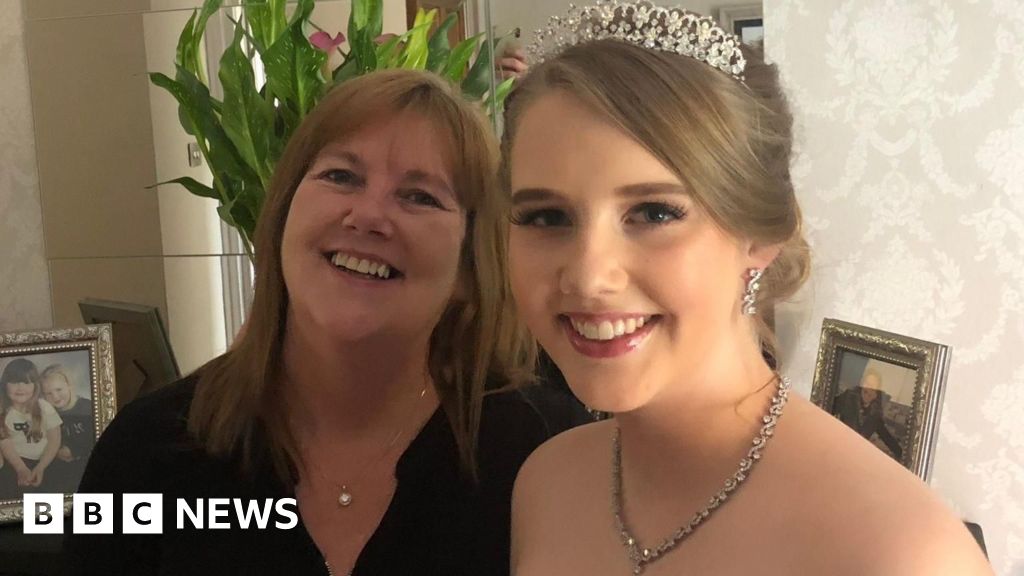When you think of suicide you may not picture someone like my mum – a middle-aged woman with four children and a loving husband.
Yet, at the age of 18, my world changed forever when she took her own life at just 53.
She never got to see my student life but, almost four years after her death, I’m about to graduate from the University of Stirling.
Through my studies I’ve had the opportunity to make a documentary that explores my mum’s suicide for BBC Scotland’s Disclosure programme.
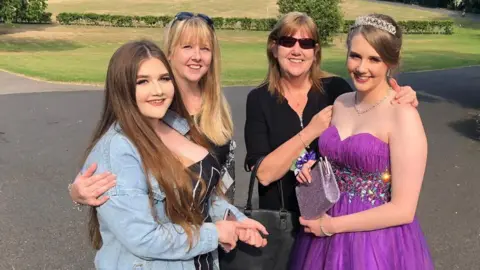 Evie Kelsall
Evie KelsallSince the moment I lost my mum, I’ve tried to understand what happened and why.
My family are from Cumbria – but the issues are the same across the UK.
While women are less likely than men to take their own lives, it shocked me to learn that the female group with the highest suicide rate is those in their early 50s.
Women exactly like my mum.
They are also more likely than men to be diagnosed with anxiety and depression and to self-harm and attempt to take their own life.
In the years before her death my mum had self-harmed and made a number of attempts on her life.
Following a cancer diagnosis in 2017 and a hysterectomy that triggered the menopause, her mental health began to deteriorate rapidly.
For months I watched her suffer, unsure how to help. I was aware she was suicidal and I knew the attempts were becoming more frequent and more severe.
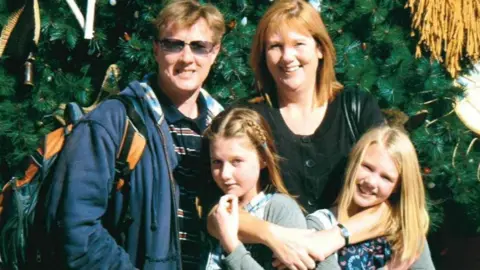 Evie Kelsall
Evie KelsallMental health teams and the police were contacted often but she was ashamed to talk about it and reluctant to engage.
A review into my mum’s death found she wasn’t moved effectively between two services – the crisis service and the community service.
It found that the mental health services available were not provided to her.
The NHS Trust involved said the coroner “did not raise any issues” with my mum’s care.
It said patient care and safety was at the heart of everything it did, and that where lessons can be learned, it implements changes.
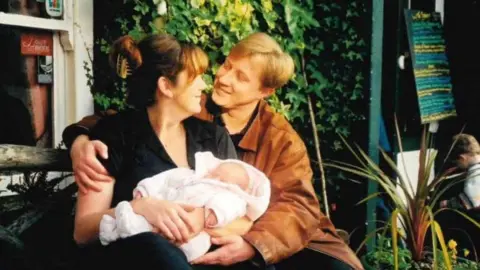 Evie Kelsall
Evie KelsallFor the past four years I felt my family carried the burden of my mum’s suicide alone.
I was ashamed I hadn’t done enough and afraid to make others uncomfortable.
Mental health is a complex issue and often there can be multiple factors which can make this period of time difficult for women, including the menopause, relationship issues, children leaving home and caring responsibilities.

Disclosure: Losing Mum to Suicide
Why is it that women are most likely to take their own lives in their early 50s? Evie Kelsall goes on an emotional journey to understand her own mum’s suicide at the age of 53.
Watch on BBC iPlayer or on BBC One Scotland at 20:00 on Monday.

For the Disclosure programme, we found that at least 39,000 women are on waiting lists for assessment or mental health treatment in Scotland.
At least 123,000 women were referred to services last year.
In NHS Greater Glasgow and Clyde, Scotland’s biggest health board, referrals are up 40% from 2020 until last year.
In other areas, such as NHS Grampian, the figure is more than 50% over the same period.
In NHS Lothian the figure is up almost 20%. Figures are based on FOI responses from 12 of 14 health boards.
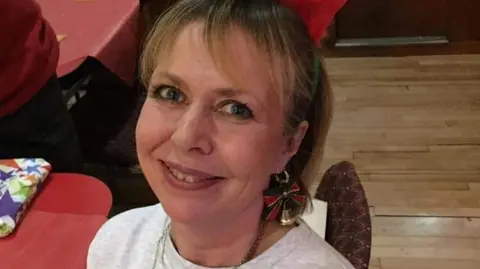 Maxine Kelly
Maxine KellyAs part of the documentary I met Maxine Kelly from Irvine, a woman a few years older than me with an almost identical story.
We connected over our shared grief and what similar people our mums were.
“My mum was funny, she loved dancing, she loved her music,” Maxine said.
“There wasn’t a moment in our house when music wasn’t playing.
“She was like sunshine in a bottle, and I wish more people got to know her.”
Meeting Maxine taught me that, like my own, her grief was complicated.
It was okay that some days I was angry and it didn’t mean I loved her any less.
Maxine had the same frustrations with her mum’s care, as I did.
Her mum, Natalie, had been in contact with a mental health team and was diagnosed with recurrent anxiety/depression and cyclothymia, a mental and behavioural disorder.
At points when self-harming or attempting suicide, the mental health team considered her to be experiencing “low grade stress-related symptoms”.
She was making weekly suicide attempts but was refused more treatment on the grounds her illness wasn’t “insight impairing”.
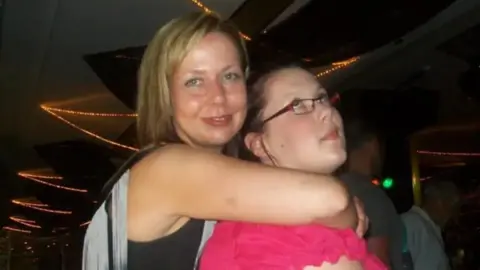 Maxine Kelly
Maxine KellyMaxine feels opportunities were missed to treat her mum and if the quality of care was higher her life may have been saved.
“I think some people viewed her as a hysterical woman. And she wasn’t. She was needing help,” Maxine told me.
The health board involved has apologised to Maxine’s family over her mum’s care.
Dr Linda Gask, a retired consultant psychiatrist in the NHS, said: “Women may not take their lives as frequently as men, but they self-harm much more.
“And that is so often viewed as women somehow asking for help in the wrong way.
“And that is not taken seriously as a sign that women need help. It’s viewed as being a nuisance by many people.”
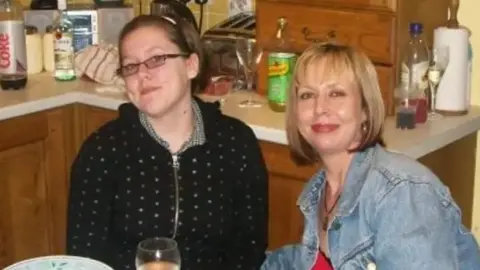 Maxine Kelly
Maxine KellyI also met Linda Fisken from Perth. After a suicide attempt in 2017 she set up a support group for women struggling with their mental health. The group is called Linda’s Ladies.
She was chatty and bubbly and takes care of her dad full time, it was hard to imagine such a person feeling suicidal.
Linda, Natalie and my mum Karen were all outgoing, kind and friendly women. They still all battled with their mental health in an extreme way.
Linda’s life is the epitome of inspirational for those struggling – not only overcoming her own mental health issues but now helping others.
“Look at me,” Linda said.
“There is hope. I was spared, so I was put on here for a reason. So maybe this is my reason.”
She helped me understand what my mum went through not only mentally but from the eyes of a mother with daughters to take care of and the guilt she felt putting them through that.
I felt as if I had the conversation I never got to have with my own mum.
Helped me understand
I never set out to find an explanation for what happened to my mum, mental health is complicated and I know there usually isn’t a simple “why”.
But meeting these people has helped me understand her, the things she went through and the pressures she faced.
I know that I cannot bring her back but I hope my family sharing their story urges other people to get the help they need.
My mum was beautiful, intelligent and funny. She was generous, protective and taught me everything I want to be in life and she promised me I was capable of doing it.
My dad Andrew loves me enough for a mum and dad.
Her kindness lives on through my sister Nicole. Her sense of humour she gave to my sister Natalie. My sister Eden now carries me through life the way my mum used to.
A feature length film couldn’t begin to do her life justice – but I hope this documentary makes a start.
- Need help? If you have been affected by this story the BBC Action Line web page features a list of organisations which are ready to provide support and advice.
